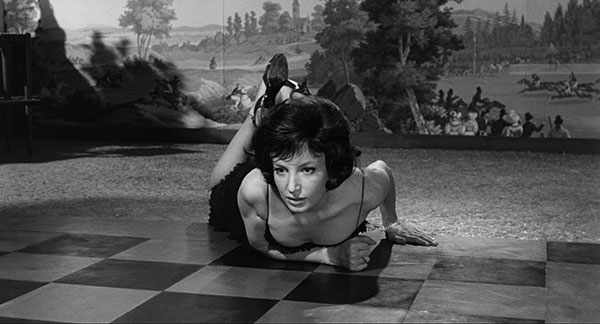
Dir: Michelangelo Antonioni | Cast: Jeanne Moreau, Marcello Mastroianni, Monica Vitti | Drama | Italy | 122’
Antonioni’s great early 1960s trilogy (L’Avventura, La Notte and L’Eclisse) continues to mesmerise in its haunting multi-layered originality without diminishing in its
mystery. Indeed, the puzzle of existence is the films’ raison d’être. What does it mean to be truly human? And if we have any inkling of an answer to that question how do we meaningfully connect with others to overcome our individual loneliness?
LA NOTTE posits these questions in the context of a bourgeois middle class marriage that is desperately failing. Antonioni never concerns himself with great angry outbursts – the vicissitudes of a naturalistic domestic life are not his territory: but explores how abstractly observed frustration coalesces with a form of passive aggression. The marital tension turns reflective, even static. Antonioni’s prowling camera conveys a calm – though never emotionally arid – neutral ground. Whilst other directors would aim for obvious realism, naturalism or even satire; Antonioni’s cinema is deeply philosophic. What matters to Antonioni is a solitary individualism that needs connection with others so as to be better acquainted with a sense of self. But can we compromise or overcome our solitude?
Nothing happens in La Notte. Everything happens in La Notte. It’s a soulful journey, within a hot day and night of a couple Giovanni (Marcello Mastroianni) and Lidia (Jeanne Moreau). They visit an old friend (a dying writer) in hospital, return home, wander through their apartment, the streets of Rome attend a party held by a literary loving millionaire; and then come the dawn they try to re-kindle their passion for each other. Their estrangement is observed by Antonioni’s startlingly dense and distanced technique. An elegant style of suggestion and nuance – without ever becoming mannered – creates a moral ambiguity; not through the eye of a moralist, but a filmmaker’s drawing board, where nothing is planned in advance, but remains fluid and spontaneous.
Antonioni is always providing a blue-print for a building (cinematic home) for his characters. The foundations may be in doubt but Antonioni compassionately observes the vulnerability of his men and women: the tension in these relationships more often quietly implodes more than explodes (Zabrieskie Point’s explosions being an exception where the suffocating materialism of things is destroyed through a kind of fantasy wish fulfilment).
Many words have been written about Lidia (Jeanne Moreau) and her famous walk through Milan on that hot Saturday afternoon. It’s usually discussed in terms of sexual symbolism (the erosion of her marriage). This sequence is interrupted, more than intercut, with scenes of her husband Giovanni waiting anxiously at home. He reads a letter, paces restlessly thorough his high-rise flat, to eventually fall asleep on a couch. Giovanni the writer/intellectual feels unable to save the marriage. Lidia’s walk through the cityscape is her break from this emotional sterility. However a further sub-text for the walk is for me the signalling of modes and styles of post war Italian cinema.
Lidia smiles in reaction to two men enjoying a laugh on the street. Next she feebly attempts to comfort a crying toddler in a run down, almost war damaged, slum. Both moments echo neo-realist and post neo-realist imagery (I’m thinking of early Fellini-such films as I Vitteloni and Rossellini’s war trilogy). Next, an old woman eating her lunch, scraping at a food carton, has the appearance of a De Sica character in his fifties films. Then Lidia witnesses a gang fight between young men who seem to have strayed out of Pasolini’s Accatone. This is followed by Lidia joing a crowd to watch two men lighting the torches of paper rockets. As the firework rockets shoot into the sky they make you think of a party moment in Fellini (say La Dolce Vita).
La Notte’s roaming scenes are further intercut with Lidia’s body in relation to the city’s buildings. Antonioni, aided by the great photographer Gianni di Venanzo, beautifully films landscape and architecture (If you froze any frame at any moment you would have a stunning composition). Behind such brilliant modernist abstraction is the ghost of a documentary filmmaker: Antonioni’s early films were poetic short documentaries, commentaries on modern life in the late 1940’s and early 1950’. To them, and his features, he brings melancholy and sense of loss. La Notte’s nods to Italian cinema’s genres- neo-realism, realism and naturalism, are referenced and framed within Antonioni’s unique form of modernism.
La Notte is compacted with similar scenes of peoples’ alienated responses to the world round them. Most notably is the appearance of the character Valentina (Monica Vitti) at the party. Valentina threatens to come between the couple. “You’ve completely exhausted me. The two of you.” She finally says. But is her exasperation an expression of her own selfishness rather than concern? Anyway can anyone prevent this marriage from breaking up?
A rich perspective of readings can be allowed for La Notte (and most of Antonioni’s output) because of the director’s deliberate open-endedness. Things are left imprecise but rigorously shown: never creating a cold void but a moving and profound sense of how people attempt to achieve a workable authenticity, even though that’s probably unobtainable. This masterly film, coupled with its equally masterly companion films authentically records the great attempt. Alan Price©2017
NOW ON BLURAY COURTESY OF CRITERION CLASSICS